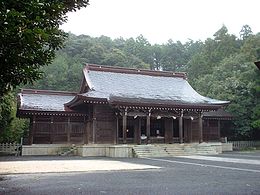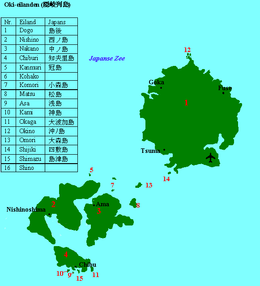Nakanoshima (Shimane)
|
Native name: 中ノ島, Nakanoshima Nickname: Ama-tō |
|
|---|---|

Oji Jinja on Nakanoshima
|
|
 |
|
| Geography | |
| Location | Sea of Japan |
| Coordinates | 36°5′N 133°06′E / 36.083°N 133.100°ECoordinates: 36°5′N 133°06′E / 36.083°N 133.100°E |
| Archipelago | Oki Islands |
| Area | 32.21 km2 (12.44 sq mi) |
| Coastline | 89.1 km (55.36 mi) |
| Highest elevation | 164 m (538 ft) |
| Administration | |
|
Japan
|
|
| Prefectures | Shimane Prefecture |
| District | Oki District |
| Town | Ama |
| Demographics | |
| Population | 2,400 (2013) |
| Ethnic groups | Japanese |
Nakanoshima (中ノ島 also Naka-no-shima?) is one of the Dōzen Islands in the Oki archipelago in the Sea of Japan. It is also known as Ama-tō (海士島?).
The island, 32.21 km² in area, has a population of approximately 2,400 persons. The island is administered by the town of Ama in Shimane Prefecture. Much of the island is within the borders of Daisen-Oki National Park.
Nakanoshima is the third largest of the Oki Islands. It is located approximately three hours by ferry north of Honshu coast. The island is of volcanic origin, with deeply indented coastline of 89.1 kilometres (55.4 mi), and with its highest point at 164 metres (538 ft) above sea level.
The climate of Nakanshima is classified as a humid subtropical climate (Köppen climate classification Cfa) with very warm summers and cool winters. Precipitation is abundant throughout the year.
The Oki Islands have been inhabited since the Japanese Paleolithic era, and numerous artifacts from the Jomon, Yayoi and Kofun periods have been found by archaeologists.
Nakanoshima was used as a place of exile from the Nara period, but is well known as the place of exile for ex-Emperor Go-Toba, who died on the island in 1239. Oki Jinja was erected on the island in 1939 in commemoration of this date. The island became part of the holdings under the control of Matsue Domain under the Tokugawa shogunate in the Edo period.
...
Wikipedia
